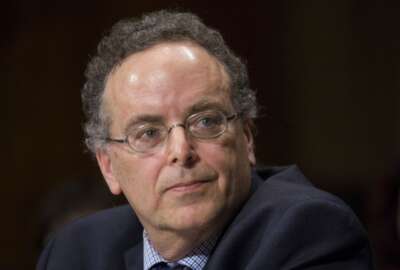
An analysis of whistleblower retaliation claims at Veterans Affairs
Whistleblowers have played a critical role in policy changes at the Veterans Affairs Department over the years, but it comes at a cost for many of them. Some fa...
Whistleblowers have played a critical role in policy changes at the Veterans Affairs Department over the years, but it comes at a cost for many of them. Some face demotions, workplace hostility, other indignities. There are mechanisms in place to protect them from being punished, but how have they performed? The Government Accountability Office recently took a look at whistleblower retaliation cases at the VA. To learn more about what they found, Federal Drive with Tom Temin spoke with Thomas Costa, a director on GAO’s Education, Workforce, and Income Security team.
Interview Transcript:
Thomas Costa First, this is an interim report. So we’re still doing ongoing work. But this report reported on sort of the statistics around the Office of Special Counsel Investigations of Whistleblower retaliation. The Office of Special Counsel is an independent agency that is specifically tasked with investigating whistleblower protections, as well as some other prohibited personnel practices that people might run afoul of. And the second objective was looking at how the Department of Veterans Affairs resolves allegations of whistleblower retaliation through settlement agreements. And as I mentioned, this work is still ongoing.
Eric White Gotcha. Ok. And so let’s get into some of those statistics. What percentage of cases involved whistleblower retaliation? And what did you find when questioning the OSC?
Thomas Costa Yeah, So a majority of the OSC cases involving VA employees do involve whistleblower protection. So it’s about a little over two-thirds, a 69% of cases involve whistleblower protection. And those cases took a median of 94 days to resolve. But if it was a favorable decision for the employee, those cases took in a median of 391 days to resolve. So it’s quite a bit longer if there’s a full investigation. But what we found is that in a majority of cases, some 59% of the cases, The OSC found that it didn’t have sufficient evidence to carry forward. And there’s some other portions of those cases that were forwarded to other agencies and so forth, but the majority of cases never actually make it through the entire process.
Eric White Yeah, that difference between cases that resolved with a favorable, with favorable not taken sides or anything, but that’s just what it means when a complaint is warranted it seems. 390 days compared to 94 days, is it just because there’s just so much more evidence to analyze? Or did they mention any reason why those investigations tend to take longer?
Thomas Costa Yeah, I mean, it really is about the amount of evidence. So they’re going to be interviewing more people. They’re going to be getting that information. And so, whenever they’re looking at that, it’s just going to take a longer period of time. But yeah, 391 days is a fairly lengthy period of time.
Eric White Yeah. And as far as evidence, I imagine that it is mostly just all testimony from what the whistleblower’s coworkers or anybody who was a witness to potential retaliation, is that the case?
Thomas Costa I believe it is. There is a lot of interviews with people. I imagine there’s also some documentation, there might be emails or things like that go around as well that people have to share. So I imagine that also can can be involved. But we didn’t actually look yet at what sort of evidence goes into all those cases yet. I think we’re going to look a little bit more into that as we carry forward with our work.
Eric White Gotcha. And so VA has its own whistleblower protection office. What role do they play in all of this?
Thomas Costa Yeah, so the VA has the OAWP, so that’s their Office of Accountability and Whistleblower Protection, and they’re an internal office. So when somebody at the VA feels like they’ve been mistreated, and because they were a whistleblower, they can go internally to the OAWP or they can go externally to the Office of Special Counsel, or they can also file a grievance with their collective bargaining agreement with their union. But the OAWP was established several years ago, because there were a number of whistleblower cases, and they’re charged with looking at misconduct by the senior executives within the VA. And so that is another avenue that people have to sort of get their grievance heard and addressed. OAWP can also work through the settlement process with people, if there is an agreement that a settlement is necessary and to avoid longer litigation in courts and so forth.
Eric White I don’t know if you did or not, but did you all look at what these settlements actually entail? I imagine it’s mostly financial stuff, but was there anything else that came about with that? And does the kind of settlement that is chosen affect which agency interacted with it?
Thomas Costa Unfortunately, we haven’t gotten to that part yet. We are going to definitely get into that with our ongoing work. But what we do know is that the VA can delegate responsibility up to a certain amount of money to different levels of staff. So if it’s a settlement that has a value of up to $5,000, it can go to middle management. If it goes up to $100,000. It has to go to more senior management and so forth. So there are levels in which that delegation of authority can work its way down. But we haven’t had a chance yet to really dig into what those settlements look like yet.
Eric White Got it. And the OAWP you mentioned, it was created because of there were some pretty high profile whistle blower retaliations going on. And a lot of congressional pressure came from the creation of that office. I’m just curious of what you can tell me since its creation, if its involvement in the whistleblower protection or if it’s involvement in whistleblower protections has been enough for the folks that created it. What is their footprint on this?
Thomas Costa So it seems to be growing. I mean, they were only created in 2017. So I think, we’ll be looking more carefully at what their footprint really is as we move forward. Their first step is to look whether or not, and the same with the OSC, whether or not they actually have jurisdiction, whether this is a whistleblower case or it’s something else that’s going on. And then, going through the investigative process, if they determine they do have jurisdiction and its appropriate case to then make a determination about a settlement. So when they reach a settlement, it could be a host of things. It could be money, it could involve additional training for the person involved or whatever, too, depending on the severity and all that sort of things as well. But generally, like you said, it’s going to involve some sort of financial restitution.
Eric White And over all of this, we’re forgetting the focus on the whistleblowers themselves. Have you had a chance to speak to any of the folks involved in these cases yet, or do you plan to?
Thomas Costa Yeah, we’re hoping to speak with a few whistleblowers as part of our ongoing work, and get more information about their experiences and how this process worked for them, how it impacted them both for the OSC side of it, as well as the OAWP side of it. So, one working more effectively than the other in addressing their concerns or in the speed in which they handled those concerns and those those sorts of questions.
Eric White And taking a look at the complaints themselves, and I don’t know if you’ve looked into this yet or not, but if there are this many whistleblowers within the VA, was just pointing out simple managerial issues? Or was it pointing out other more serious things since you are talking about health care?
Thomas Costa I don’t know that I can answer that yet. We’re going to hopefully get some more information as we dig into it more. But, I think when you’re looking at whistleblower cases, you’re generally looking at fairly serious things. So those are cases where a person felt like there was an obvious misuse or a violation of law, gross mismanagement, gross waste of funds, abuse of authority, those sorts of things. So like not little things. Whistleblowing is generally for a big thing. And when they brought that information to light, they felt like they were retaliated against. So they were demoted, they were fired or what have you. And so, this is an effort to try to protect those people a little bit more, because I know that, not just at the VA, but throughout the government, there’s always been a challenge in trying to afford whistleblowers the kinds of protections that they need.
Eric White Yeah, I imagine somebody’s got to be pretty hurt if it takes 391 days to resolve it and they’re still sticking in there.
Thomas Costa Yeah, absolutely. I guess the other thing that I would just mention, is just that caseload that OSC is dealing with has shrunk over the last several years, which is interesting. And it’s probably a result of COVID, and that people were working from home more and that sort of thing. But in part, maybe because of that, the percentage of whistleblower cases has actually gone up. The number of overall cases is down, but the percentage of the total has gone up. And so that’s something we hope to dig a little bit more into. The only other thing I would add is, the VA is a really big agency. So they are the second largest agency after the Department of Defense, and that they make up about a third of the OSC’s cases, which seems a little high. But part of that is probably because they’re such a big agency, and at least anecdotally we’ve heard that they do a decent job of notifying their staff at this point about what their options are if they are whistleblowers.
Copyright © 2024 Federal News Network. All rights reserved. This website is not intended for users located within the European Economic Area.
Tom Temin is host of the Federal Drive and has been providing insight on federal technology and management issues for more than 30 years.
Follow @tteminWFED





